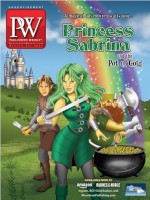Thomas Wolfe famously wrote, “You can’t go back home to your family, back home to your childhood.” Unless, that is, you’re Calvin Crosby and your home is The King’s English Bookshop. A quarter-century after Crosby, 55, left his native Utah for California, he quit his job as executive director of the California Independent Booksellers Alliance and returned to become co-owner, as of July 1, of the Salt Lake City literary icon. “There was so much that still had to be done with CALIBA, but this store is so special, so much a part of me,” Crosby explained. “The opportunity could not be passed up.”
Crosby, who is of Cherokee descent, recalled his first visit to The King’s English when he was a teenager. “Everybody was so nice,” he said. “Growing up dark at that time, you were often followed, or people would be like, ‘Can I help you?’ But I was allowed to browse. I was allowed to read a few pages. People were gracious: they talked books with me, they recommended books to me. It was a magical place.”
Even when Crosby worked at Books Inc. and Book Passage in the Bay Area before joining NCIBA, the regional booksellers association that evolved into CALIBA, The King’s English pulled at him. He said that he made it a priority to visit there every time he returned to home to see his family.
Anne Holman, who has worked at The King’s English for 21 years and has been co-owner since 2014 with cofounder Betsy Burton, noted that she and Burton had been discussing a succession plan “for a long time.” Burton, who opened the full-service general bookstore in 1977 with Ann Berman, the first of several business partners, was ready to retire after guiding the store through a difficult pandemic year that involved pivoting toward online orders and contactless curbside pickups.
“We were really unsure how to handle finding Betsy’s successor,” Holman said. “It needed to be somebody whom we felt honored the tradition of the bookstore and everything we had created.”
Burton also wanted her successor to be someone who appreciates fiction and poetry—two categories for which the bookstore is renowned. She recalled that Oren Teicher, former executive director of the American Booksellers Association, suggested she call Crosby for advice, “because he knows a lot of people.”
Teicher recently told PW that he’d hoped Crosby would take the bait. “As much as he liked his job at CALIBA,” Teicher explained, “I knew that Calvin always wanted to return to his bookselling roots. Given his Utah connections, I thought it made perfect sense for them to talk.”
Burton said, “I didn’t think he’d make me an offer when I called. It was like a fairy tale, it happened so quickly.” Regarding Crosby’s literary preferences, she added, “He understands. He loves fiction, though he has a more modern sensibility than I do.”
Holman and Crosby don’t envision any significant changes to the business model of the store—their emphasis is more on broadening its reach and strengthening the store’s impact on the greater community. Their aspirations include making The King’s English more accessible to BIPOC and underserved populations, as well as welcoming the many people moving to the region in recent years. They also want to, Holman said, “add new and interesting things for the future” in order to “keep growing” and “moving forward.”
One of the first orders of business is reaching out to schools in communities in need surrounding Salt Lake City, including in a Navajo reservation east of the city. To this end, The King’s English is in the process of obtaining a bookmobile. “If we can just bring books to those kids in those schools,” Holman said, “we can partner with publishers and companies that are local.”
Crosby and Holman also plan to expand The King’s English’s approximately 2,000-sq.-ft. retail area in creative ways. On Sundays, they invite local artisans and other makers—with an emphasis on BIPOC, gay, and women entrepreneurs—to set up displays on the store’s 300-sq.-ft. patio. Holman said the pop-ups include “an eight-year-old who makes great jewelry,” painters, potters, and “a new queer bookseller, who just signed the lease on a physical location.” Future patio pop-ups will feature Indigenous makers, flower sellers, and food trucks.
Holman said Crosby came at a good time, noting that most booksellers are making big changes as a result of Covid-19. “We worked really hard during the pandemic,” Holman explained. “We were tired. This is a good time to get our breath back, start something new.”



 Volume 268
Issue 34
08/23/2021
Volume 268
Issue 34
08/23/2021





